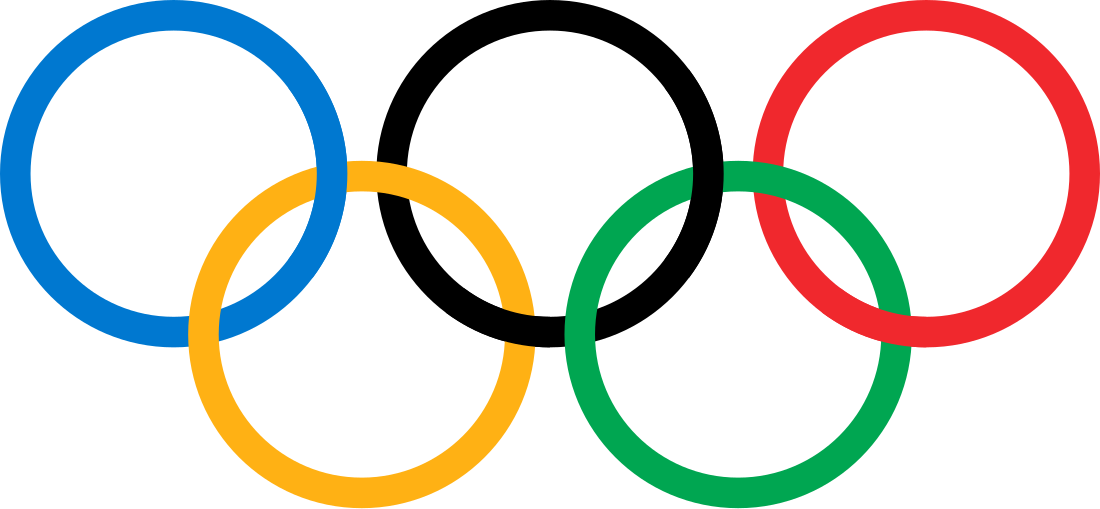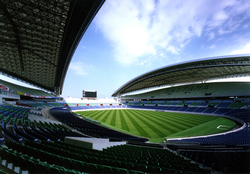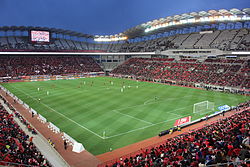Top Qs
Timeline
Chat
Perspective
Football at the 2020 Summer Olympics – Men's tournament
Olympics event From Wikipedia, the free encyclopedia
Remove ads
The men's football tournament at the 2020 Summer Olympics was held from 22 July to 7 August 2021. Originally, it was to be held from 23 July to 8 August 2020, but the Summer Olympics were postponed to the following year due to the COVID-19 pandemic. However, the official name of the games remains the 2020 Summer Olympics.[1] It was the 27th edition of the men's Olympic football tournament. Together with the women's competition, the 2020 Summer Olympics football tournament was held at six stadiums in six cities in Japan. The final was hosted at the International Stadium in Yokohama. Teams participating in the men's competition were restricted to under-24 players (born on or after 1 January 1997) with a maximum of three overage players allowed. The men's tournament is typically restricted to under-23 players though following the postponement of the Olympics by a year, FIFA decided to maintain the restriction of players born on or after 1 January 1997.[2]
Brazil were the defending champions and successfully retained their title.[3]
Remove ads
Schedule
The match schedule of the tournament as of 5 December 2018.[4]
| G | Group stage | ¼ | Quarter-finals | ½ | Semi-finals | B | Bronze medal match | F | Gold medal match |
Qualification
Summarize
Perspective
In addition to host nation Japan, 15 men's national teams will qualify from six separate continental confederations. The Organising Committee for FIFA Competitions ratified the distribution of spots at their meeting on 14 September 2017.[5]
- ^1 Dates and venues are those of final tournaments (or final round of qualification tournaments), various qualification stages may precede matches at these specific venues.
Remove ads
Venues
Due to the COVID-19 pandemic in Japan, most matches were played behind closed doors without any spectators, including the final.[14][15] However, Miyagi Stadium allowed a limited audience to attend matches and Kashima Stadium permitted local schoolchildren as part of the school program but Olympic spectators were still not allowed.[16]
Squads
The men's tournament was an international tournament with restrictions on age: players had to be born on or after 1 January 1997, with three overage players allowed for each squad in the final tournament. Traditionally the roster rules required each team to submit a squad of 18 players, two of whom must be goalkeepers. Each team also named a list of four alternate players, who could replace any player in the squad in case of injury during the tournament.[17] In late June 2021 the International Olympic Committee and FIFA announced that all 22 players of each team would be available for selection before each match. Prior to each match, the teams chose from their total of 22 players, a roster of 18 players to be available for play in that match.[18] The rule change was made in regards to the challenges presented by the COVID-19 pandemic.[19]
Remove ads
Match officials
Summarize
Perspective
In June 2020, FIFA approved the use of the video assistant referee (VAR) system for the tournament.[20] The match officials were announced on 23 April 2021.[21][22]
Remove ads
Draw
The draw for the tournament was held on 21 April 2021, 10:00 CEST (UTC+2), at the FIFA headquarters in Zürich, Switzerland.[23] It was conducted by Sarai Bareman, FIFA chief women's football officer, while Samantha Johnson presented the ceremony. Lindsay Tarpley and Ryan Nelsen acted as the draw assistants.[24]
The sixteen teams were drawn into four groups of four teams.[25] The hosts Japan were automatically seeded into Pot 1 and assigned to position A1, while the remaining teams were seeded into their respective pots based on their results in the last five Olympics (more recent tournaments weighted more heavily), with bonus points awarded to confederation champions. No group could contain more than one team from each confederation.[26]
Remove ads
Group stage
Summarize
Perspective
The competing countries were divided into four groups of four teams, denoted as groups A, B, C and D. Teams in each group played one another in a round-robin basis with the top two teams of each group advancing to the quarter-finals.
All times are local, JST (UTC+9).[27]
Tiebreakers
The ranking of teams in the group stage was determined as follows:[17]
- Points obtained in all group matches (three points for a win, one for a draw, none for a defeat);
- Goal difference in all group matches;
- Number of goals scored in all group matches;
- Points obtained in the matches played between the teams in question;
- Goal difference in the matches played between the teams in question;
- Number of goals scored in the matches played between the teams in question;
- Fair play points in all group matches (only one deduction could be applied to a player in a single match):
- Yellow card: −1 point;
- Indirect red card (second yellow card): −3 points;
- Direct red card: −4 points;
- Yellow card and direct red card: −5 points;
- Drawing of lots.
Group A
Referee: Chris Beath (Australia)
Referee: Jesús Valenzuela (Venezuela)
Referee: Kevin Ortega (Peru)
Referee: Artur Soares Dias (Portugal)
Referee: Iván Barton (El Salvador)
Referee: Matthew Conger (New Zealand)
Group B
Referee: Victor Gomes (South Africa)
Referee: Leodán González (Uruguay)
Referee: Orel Grinfeld (Israel)
Referee: Jesús Valenzuela (Venezuela)
Referee: Kevin Ortega (Peru)
Group C
Referee: Adham Makhadmeh (Jordan)
Referee: Srđan Jovanović (Serbia)
Referee: Georgi Kabakov (Bulgaria)
Referee: Bamlak Tessema Weyesa (Ethiopia)
Referee: Ismail Elfath (United States)
Group D
Referee: Iván Barton (El Salvador)
Referee: Bamlak Tessema Weyesa (Ethiopia)
Remove ads
Knockout stage
Summarize
Perspective
In the knockout stage, if a match was level at the end of normal playing time, extra time was played (two periods of 15 minutes each) and followed, if necessary, by a penalty shoot-out to determine the winner.[17]
Bracket
| Quarter-finals | Semi-finals | Gold medal match | ||||||||
| 31 July – Yokohama | ||||||||||
| 3 | ||||||||||
| 3 August – Kashima | ||||||||||
| 6 | ||||||||||
| 0 (1) | ||||||||||
| 31 July – Saitama | ||||||||||
| 0 (4) | ||||||||||
| 1 | ||||||||||
| 7 August – Yokohama | ||||||||||
| 0 | ||||||||||
| 2 | ||||||||||
| 31 July – Kashima | ||||||||||
| 1 | ||||||||||
| 0 (4) | ||||||||||
| 3 August – Saitama | ||||||||||
| 0 (2) | ||||||||||
| 0 | ||||||||||
| 31 July – Rifu | ||||||||||
| 1 | Bronze medal match | |||||||||
| 5 | ||||||||||
| 6 August – Saitama | ||||||||||
| 2 | ||||||||||
| 3 | ||||||||||
| 1 | ||||||||||
Quarter-finals
Referee: Ismail Elfath (United States)
Referee: Chris Beath (Australia)
Semi-finals
Referee: Georgi Kabakov (Bulgaria)
Referee: Kevin Ortega (Peru)
Bronze medal match
Referee: Bamlak Tessema Weyesa (Ethiopia)
Gold medal match
Remove ads
Statistics
Goalscorers
There were 93 goals scored in 32 matches, for an average of 2.91 goals per match.
5 goals
4 goals
3 goals
2 goals
1 goal
 Tomás Belmonte
Tomás Belmonte Facundo Medina
Facundo Medina Marco Tilio
Marco Tilio Lachlan Wales
Lachlan Wales Malcom
Malcom Paulinho
Paulinho Amar Hamdy
Amar Hamdy Ahmed Yasser Rayyan
Ahmed Yasser Rayyan Téji Savanier
Téji Savanier Eduard Löwen
Eduard Löwen Felix Uduokhai
Felix Uduokhai Juan Carlos Obregón Jr.
Juan Carlos Obregón Jr. Luis Palma
Luis Palma Rigoberto Rivas
Rigoberto Rivas Eric Bailly
Eric Bailly Max Gradel
Max Gradel Franck Kessié
Franck Kessié Ritsu Dōan
Ritsu Dōan Daizen Maeda
Daizen Maeda Kaoru Mitoma
Kaoru Mitoma Koji Miyoshi
Koji Miyoshi Hiroki Sakai
Hiroki Sakai Roberto Alvarado
Roberto Alvarado Uriel Antuna
Uriel Antuna Johan Vásquez
Johan Vásquez Liberato Cacace
Liberato Cacace Abdulelah Al-Amri
Abdulelah Al-Amri Salem Al-Dawsari
Salem Al-Dawsari Kobamelo Kodisang
Kobamelo Kodisang Evidence Makgopa
Evidence Makgopa Teboho Mokoena
Teboho Mokoena Kim Jin-ya
Kim Jin-ya Um Won-sang
Um Won-sang Won Du-jae
Won Du-jae Marco Asensio
Marco Asensio Mikel Merino
Mikel Merino Dani Olmo
Dani Olmo
1 own goal
 Benjamin Henrichs (against Ivory Coast)
Benjamin Henrichs (against Ivory Coast) Elvin Oliva (against Romania)
Elvin Oliva (against Romania) Marius Marin (against South Korea)
Marius Marin (against South Korea) Abdulelah Al-Amri (against Ivory Coast)
Abdulelah Al-Amri (against Ivory Coast)
Source: FIFA
Final ranking
As per statistical convention in football, matches decided in extra time are counted as wins and losses, while matches decided by penalty shoot-outs are counted as draws.
Remove ads
Notes
- Played behind closed doors due to the COVID-19 pandemic in Japan[31]
References
External links
Wikiwand - on
Seamless Wikipedia browsing. On steroids.
Remove ads








